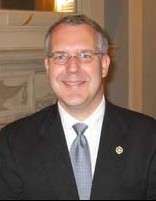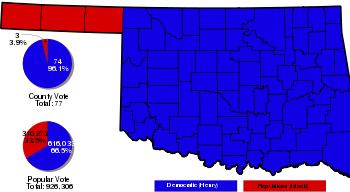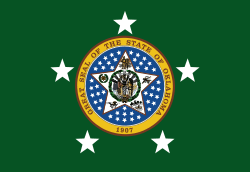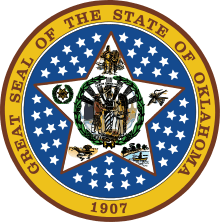Brad Henry
| Brad Henry | |
|---|---|
 Henry in 2004 | |
| 26th Governor of Oklahoma | |
|
In office January 13, 2003 – January 10, 2011 | |
| Lieutenant |
Mary Fallin Jari Askins |
| Preceded by | Frank Keating |
| Succeeded by | Mary Fallin |
| Member of the Oklahoma Senate | |
|
In office 1992–2003 | |
| Personal details | |
| Born |
July 10, 1963 Shawnee, Oklahoma, U.S. |
| Political party | Democratic |
| Spouse(s) | Kim Henry |
| Children | 3 daughters |
| Alma mater | University of Oklahoma |
| Religion | Baptist |
Charles Bradford "Brad" Henry (born July 10, 1963) is an American politician who was the 26th Governor of Oklahoma. A member of the Democratic Party, he was elected governor in 2002. Henry won re-election for a second term on November 7, 2006 with 66% of the vote.[1]
Henry was the third governor and second Democrat in Oklahoma history to hold two consecutive terms, along with Democrat George Nigh and Republican Frank Keating. In 2010, Henry was ineligible to run for re-election even though he maintained high approval ratings, because of term limits set by the Oklahoma Constitution. His second term ended on January 10, 2011, and he was succeeded as governor by Republican Mary Fallin.
Henry had been mentioned as a possible candidate for the U.S. Senate, but declined to run in the 2014 special election to replace Tom Coburn.[2][3]
Early life and education
Henry was born in Shawnee, Oklahoma, the son of Charles Henry, a prominent judge and former state representative.[4] After graduating from Shawnee High School in 1981, Henry attended the University of Oklahoma as a President's Leadership Scholar and earned a bachelor's degree in economics in 1985.[4] He was a member of Delta Tau Delta Fraternity. In 1988, he was awarded his law degree from the University of Oklahoma College of Law, where he served as managing editor of the Law Review.[4]
Henry practiced law in Shawnee, Oklahoma before running for the Oklahoma State Senate.[5] He served as a state senator from 1992 until he became governor.[5]
Gubernatorial campaigns
2002 gubernatorial election
In the 2002 election for governor, Henry defeated State Senator Enoch Kelly Haney and businessman Vince Orza in the primary election. In the general election, he defeated former Republican Congressman Steve Largent, an NFL Hall of Famer, by just over one-half of one percent of the vote, in a race that also included Independent candidate Gary Richardson, a retired federal prosecutor. Henry received 448,143 votes (43.27%) to Largent's 441,277 votes (42.61%). Richardson, a former Republican candidate, received 146,200 votes (14%).[6]
Henry ran a campaign of "barnstorming" rural areas, and stopping at Wal-Mart stores in an RV with supporters. Henry was endorsed by football coach Barry Switzer, who has widespread popularity in the Sooner State and accompanied Henry to many campaign events.
On the policy side of the campaign, Henry ran on the platform of the "education governor." He argued for increasing teachers' salaries and funding for higher education in the state by approving a state lottery to raise money.
2006 campaign
In the Democratic Party primary election on July 25, 2006, Henry received 218,712 votes, 86% of the vote.[7]
In the November 7 general election, Henry faced Fifth District U.S. Congressman Republican Ernest Istook and won with 66% of the vote.[1] He won with a higher total than any gubernatorial candidate in almost fifty years.[8]
Governor of Oklahoma
Henry was sworn in as Oklahoma's 26th governor on January 13, 2003, with the oath of office being administered by his cousin, federal appeals court judge Robert Harlan Henry. As governor, he was a member of the National Governors Association, the Southern Governors' Association, and the Democratic Governors Association. He was the president of the Council of State Governments in 2007.
Henry made national headlines by giving sanctuary from the redistricting warrant to Texas Democrats in that state's legislature by allowing them to travel across state lines into Oklahoma en masse to deny a quorum for voting on a redistricting plan. "Our position is that, without a warrant signed by a judge, we have no authority. Even under those circumstances, we are hesitant to get pulled into a Texas political battle. If we're going to do battle with Texas, we prefer that it be on the football field," Henry said through his spokesman.
As a tax-cutting governor, Henry has sought a stance of moderation on most political hot button issues and seemingly has appeal across party lines.[9] Henry is pro-choice and has vetoed legislation to mandate ultrasound viewings prior to abortion procedures. He has a mixed view of racial affirmative action, supporting it in college and graduate schools, but not in hiring for the bureaucracy. Henry supports expanding public healthcare and holding HMOs accountable for poor care; however, he also is in favor of upholding the death penalty and is against gun control. The governor supports tax cuts for the lower and middle classes and believes in keeping the income tax; he also supports using the "War on Drugs" strategy to combat methamphetamine use within his state.[9]
On May 27, 2004, Governor Brad Henry issued Executive Order 04-21, which created the Governor's Ethnic American Advisory Council.[10] The Ethnic American Advisory Council then published an English translation of the Quran embossed with the Oklahoma State seal which was then distributed to 149 Oklahoma state legislators.[11] There were 35 lawmakers who declined to accept the copy of the Quran that they were offered.[12] After refusing the copy of the Quran, Republican State Representative Rex Duncan wrote a letter to his colleagues explaining, "Most Oklahomans do not endorse the idea of killing innocent women and children in the name of ideology." Further, Duncan said during a TV interview "I think it was inappropriate that they used a state centennial seal on a religious item."[13]
In 2003, Henry signed bills into law that: made downloading child pornography a crime, strengthened the financial oversight of HMOs by the state, created a $300,000 cap on noneconomic damages for obstetric and emergency room cases except in wrongful death cases or if negligence is shown and made other changes to regulate medical liability actions, penalized predatory lending, authorized payday lending, and placed a moratorium on the sale of water from a sole source aquifer.[14] He also was a strong supporter of a ballot proposal to establish a statewide lottery to benefit schools.[14]
In 2004, Henry signed a bill into law that set out a total of $2,100 in across-the-board salary increases for state employees, public school teachers and state troopers.[15] He also signed legislation to limit the sale of pseudoephedrine used to make crystal meth.[15]
In 2008, Henry vetoed an anti-abortion measure which required, among other things, women to get an ultrasound before having an abortion. The veto was overridden and was the first override in Oklahoma since 1994, when Gov. David Walters was in office.[16] That law was struck down by a state district court, but passed again in April 2010, whereupon Henry again vetoed it.[17] His veto was again overridden.[18]
Despite Henry's high job approval ratings and avoidance of controversy, Oklahoma voters approved a term limit holding the governor to a total length of time of eight years in office. The law already provided for a term limit of two consecutive terms for the governor. This effectively prohibited Henry, then 47, from making a comeback attempt at a later date.[19]
However, later in the fall of 2013, Henry stated the initiative didn't apply to him: claiming he was already term limited by the State Constitution before the proposition was approved. Supporters had asked Henry to run in the 2014 elections against incumbent Republican governor Mary Fallin, but Henry refused to challenge the incumbent Republican; but didn't rule out another gubernatorial campaign in the future.
Oklahoma Supreme Court appointments
Governor Henry appointed the following Justices to the Oklahoma Supreme Court:
- James E. Edmondson – 2003
- Steven W. Taylor – 2004
- Tom Colbert – 2004, making Henry the first governor to appoint an African American justice to the Court.
- John F. Reif – 2007
- Doug Comb – 2010
Budget proposals
Governor Henry submitted the following budgets to the Oklahoma Legislature: 2004, 2005, 2006, 2007, 2008, 2009, 2010, and 2011.
Legacy
Henry was widely expected to be named President of the University of Central Oklahoma. However, the state's largest newspapers, The Daily Oklahoman and The Tulsa World, both editorialized against the appointment of Henry as UCO president by the UCO Board of Regents, which was appointed by Henry. Another candidate, Don Betz, was named to the position. Henry was considered a likely choice to be Dean of the Oklahoma City University School of Law. However, U.S. Federal Magistrate Valerie Couch was appointed. As governor, Henry appointed 5 members of the Oklahoma Supreme Court and delivered the 2010 commencement address at the OCU School of Law. Henry has strong experience as Oklahoma Senate Judiciary Chairman, OU Law Review Editor and considerable skills in fundraising.
Election results


| Candidates | Party | Votes | % | ||
|---|---|---|---|---|---|
| Brad Henry | Democratic Party | 448,143 | 43.27% | ||
| Steve Largent | Republican Party | 441,277 | 42.61% | ||
| Gary Richardson | Independent | 146,200 | 14.12% | ||
| Total | 1,035,620 | 100.0% | |||
| Source: 2002 Election Results | |||||
| Candidates | Party | Votes | % | ||
|---|---|---|---|---|---|
| Brad Henry (Incumbent) | Democratic Party | 616,033 | 66.50% | ||
| Ernest Istook | Republican Party | 310,273 | 33.50% | ||
| Total | 926,306 | 100.0% | |||
| Source: 2006 Election Results | |||||
References
- 1 2 "Governor/Oklahoma." American Votes 2006. CNN.com. Retrieved 10–13–09.
- ↑ http://mobile.nytimes.com/blogs/fivethirtyeight/2013/02/20/can-republicans-win-the-senate-in-2014/
- ↑ John Gizzi (January 17, 2014). "Istook: Democrat Will Be 'Sacrificial Lamb' for Coburn Seat". Newsmax. Retrieved January 18, 2014.
- 1 2 3 Everett, Dianna (2009). "Henry, Charles Bradford (1963– )". Encyclopedia of Oklahoma History and Culture (online ed.). Oklahoma Historical Society.
- 1 2 "Oklahoma Governor Brad Henry" Archived February 7, 2007, at the Wayback Machine. National Governor's Association . Retrieved February 19, 2010.
- ↑ "General Election November 5, 2002." State Election Board. Retrieved 10–13–09.
- ↑ http://www.kfor.com/Global/story.asp?S=5002149
- ↑ Jenkins, Ron."Henry Scores Historic Win Over Istook in Okla. Governor's Race." Associated Press, November 9, 2006. Retrieved 10–13–09.
- 1 2 "Brad Henry." OntheIssues.org. Retrieved 10–13–09.
- ↑ "Governor's Ethnic American Advisory Committee." Oklahoma Office of Personnel Management. Retrieved 10–13–09.
- ↑ Oklahoma legislator refuses free Qur'an!. News.faithfreedom.org. Retrieved on 2011-01-01.
- ↑ Hinton, Mick. "Worldwide notice of Quran flap surprises all involved." Tulsa World, November 4, 2007. Retrieved 10–13–09.
- ↑ Home. KFSM. Retrieved on 2011-01-01.
- 1 2 2003 Session Highlights Archived May 19, 2011, at the Wayback Machine., Oklahoma House of Representatives (accessed June 28, 2013)
- 1 2 2004 Session Highlights Archived May 19, 2011, at the Wayback Machine., Oklahoma House of Representatives (accessed June 4, 2013)
- ↑ Hoberock, Barbara. "Henry's veto is overthrown." Tulsa World, April 18, 2008. Retrieved 10–13–08.
- ↑ Hoberock, Barbara. "Henry vetoes 2 abortion bills." Tulsa World, April 24, 2010. Retrieved 04–24–10.
- ↑ Talley, Tim. "Okla. House overrides abortion restrictions vetoes." The Huffington Post, April 26, 2010. Retrieved 05-03-2010.
- ↑ Oklahoma State Election Board
External links
| Wikimedia Commons has media related to Brad Henry. |
- Oklahoma Governor Brad Henry official state website
- Everett, Dianna. "Henry, Charles Bradford (1963–)" Encyclopedia of Oklahoma History & Culture. Retrieved 10–13–09
| Party political offices | ||
|---|---|---|
| Preceded by Laura Boyd |
Democratic nominee for Governor of Oklahoma 2002, 2006 |
Succeeded by Jari Askins |
| Political offices | ||
| Preceded by Frank Keating |
Governor of Oklahoma 2003–2011 |
Succeeded by Mary Fallin |

